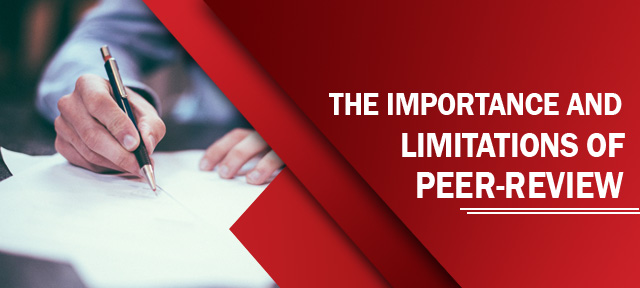Peer-review is a means of creating quality and legitimacy for research. It is a process where peer experts from different fields provide an informed critical evaluation of the scholarly depth of a manuscript or research. It ensures quality assurance and plays a key role in advancing careers in research. The intellectual product of a researcher is critically analyzed along with recommendations for modifications.

Type of peer reviews
The most commonly known peer-review is the single-blind review, where reviewers are aware of the author’s identity but the reviewer’s identity is not revealed to the author. There are also double-blind reviews, where both the parties keep their identities concealed and no details are revealed. Open peer-review, on the other hand, is one in which both parties are aware of each other’s details.
Advantages of peer reviews
Peer-reviews play an important role in filtering out irrelevant research and providing readers with the most pertinent and reputed ones. These researches are not only crucial in the concerned academic domain but also in sectors like health, government, food, etc., which rely on high-quality studies. Another important aspect of a peer-review is improving the author’s work by providing them with critical feedback.
Limitations of peer reviews
Like everything else, peer-reviewed manuscripts have their limitations too. It is important to understand that certain lesser-known journals find it difficult to get renowned reviewers. This is because some single-blind reviewers filter-out papers based on their source. Therefore, sometimes such journals are ready to accept submissions that may not meet all the requirements. This implies that having a study peer-reviewed is great, but one should also refer to the journal and its overall standing in the academic or scientific circuit.
One should also understand that an esteemed expert would have more papers to review compared to others. This also implies that the reviewer would have less time to commit to each review. That is why, despite the high-quality of the final product,a peer review does not always guarantee accuracy. Also, the heavy workload of popular reviewers may delay the publishing of the paper. Another potentially confusing aspect for authors is when a journal requires the paper to be reviewed by more than one reviewer. The inconsistency in the comments between different experts could sometimes be very baffling for the author.
Due to their own inclination or disinclination towards certain research, institution, or author, peers may sometimes also develop a bias against the study that needs to be reviewed. While this may result in the acceptance of a low-quality study, it could also result in rejection of the manuscript.
A double-blind review would be an option to avoid such a scenario. In order to facilitate this, it is important that the author is aware of it right from the beginning and he avoids giving any kind of hint about his identity anywhere in his manuscript.
Despite the limitations, peer-reviews are an integral part of any academic or scientific research. They help scrutinize a study in order to decide its aptness and validity for publication.

